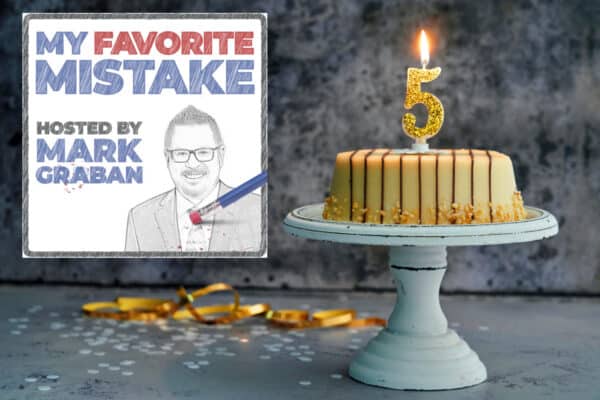When I launched the My Favorite Mistake podcast in September 2020, I hoped to create space for leaders and innovators to share the moments they wished they could take back — and more importantly, what they learned from them.

Five years and more than 300 episodes later, one theme rings true: mistakes are not the end of the story. They are the beginning of learning.
As someone deeply shaped by Toyota and Lean, I've been struck by how often guests with Toyota connections or Lean thinking backgrounds have surfaced the same lessons:
- Mistakes only matter if we fail to learn from them.
- Leaders set the tone: do we shame and silence, or reflect and improve?
- Respect for people and kindness are prerequisites for continuous improvement.
- Our biggest errors often come not from lack of effort, but from untested assumptions.
- And without psychological safety, none of this can work.
In marking this five-year milestone, I want to revisit the voices of Isao Yoshino, Katie Anderson, David Meier, Sabrina Moon, Karyn Ross, Keith Ingels, Matt May, and Amy Edmondson. Their reflections form a powerful mosaic of what it means to lead with Lean principles when mistakes inevitably happen.
1. Learning Through Reflection: Yoshino and Meier
Isao Yoshino (Episode 30) shared one of his earliest mistakes at Toyota, when a misunderstanding in the paint shop led to 100 cars being repainted. What stayed with him was not blame, but how his manager responded:
“The first thing his manager said to him was thank you for pointing out to us that we didn't set you up for success. You're new, and the way we had this set up, this mistake was absolutely possible.“
That reframing shaped Yoshino's career: mistakes weren't about personal failure, but about surfacing opportunities for leaders and systems to improve. Later, after leading a $13 million failed boat project, Toyota President Cho reassured him:
“We all make mistakes, particularly when we try something totally new. We know you took on a challenge and worked so hard to make it happen.”
These experiences taught Yoshino the profound Toyota lesson of hansei — reflection that turns error into growth.
David Meier (Episode 94), who worked at Toyota in Georgetown, Kentucky (TMMK), echoed this in his own story of a costly blunder:
“At Toyota, whenever a mistake occurs… the only failure is the failure to learn.”
For both Yoshino and Meier, Lean isn't about erasing mistakes. It's about creating a system where reflection is the natural, safe, and expected response.
2. Leadership Without Shame: Moon, Ross, and Ingels
Not all mistakes are technical. Some of the most damaging — and transformative — come from how leaders treat people.
Sabrina Moon (Episode 35) reflected on her early years as a plant leader:
“I would say things like, ‘What is wrong with you? You suck. You're an idiot.'… Those are not proud moments. That was motivating temporarily, but it was corroding trust and creating an environment where people felt the need to come out swinging toward me.”
Her realization was that shame might produce compliance, but it kills continuous improvement. Respect for people is not optional in Lean — it's the foundation.
Karyn Ross (Episode 3), consultant, coach, and co-founder of Women in Lean, brings a similar message but framed positively. For her, kindness is the underappreciated Lean principle:
“If we can lead with kindness — for ourselves, for others, and for our customers — we create the conditions where mistakes become opportunities instead of threats.”
And Keith Ingels (Episode 62), reflecting on a 5S misstep where he assumed visuals weren't necessary, pulled the lesson forward into culture:
“We work to create a culture where it's OK to talk about mistakes, so we can learn about them.”
Together, these leaders remind us that Lean leadership is not about being right, but about creating trustworthy spaces where others can be wrong — safely.
3. Challenging Assumptions: May and Anderson
Many of the most insidious mistakes come not from carelessness, but from assumptions left untested.
Matt May (Episode 39), author of The Elegant Solution and Winning the Brain Game, summed it up:
“The real mistake is thinking we already know. Lean asks us to pause, test, and challenge our assumptions — because it's our thinking that trips us up most often.”
Katie Anderson (Episode 128) lived this firsthand when she recorded her audiobook (Learning to Lead, Leading to Learn) at home during the pandemic. Despite her careful preparation, listeners quickly noticed inconsistencies in sound quality. Her reflection led her back to Lean principles:
“Within days of the audiobook coming out, I realized that there were sections of the audiobook where the sound quality was not up to my expectations.”
Digging deeper, she discovered the issue wasn't just technical — it was about unspoken assumptions:
“We need to dive deeper into assumptions, even the unspoken ones, and how they impact actions and outcomes.”
Her experience mirrored Toyota's andon philosophy: problems must be surfaced immediately, and leaders must check their assumptions rather than rely on them.
4. Creating Psychological Safety: Edmondson
All of these lessons rest on one essential foundation: psychological safety.
As Dr. Amy Edmondson (Episode 234) of Harvard Business School told me:
“Psychological safety isn't about being nice. It's about creating a climate where candor is expected — where people can say, ‘I don't know,' or ‘I made a mistake,' and it's treated as information, not incompetence.”
Without psychological safety, reflection stalls, kindness is empty, and assumptions go unchallenged. With it, Lean systems thrive.
Five Years, Enduring Lessons
Looking across these episodes, the Lean/Toyota voices converge around a shared truth:
- Mistakes are teachers (Yoshino, Meier).
- Respect and kindness create trust (Moon, Ross, Ingels).
- Assumptions are dangerous; challenge them (May, Anderson).
- Psychological safety makes it all possible (Edmondson).
Five years of My Favorite Mistake confirm what Toyota has modeled for decades: success does not come from avoiding mistakes — it comes from how we respond to them.
Thanks to all of my guests and to my listeners!
Please scroll down (or click) to post a comment. Connect with me on LinkedIn.
Let’s build a culture of continuous improvement and psychological safety—together. If you're a leader aiming for lasting change (not just more projects), I help organizations:
- Engage people at all levels in sustainable improvement
- Shift from fear of mistakes to learning from them
- Apply Lean thinking in practical, people-centered ways
Interested in coaching or a keynote talk? Let’s talk.
Join me for a Lean Healthcare Accelerator Trip to Japan! Learn More









